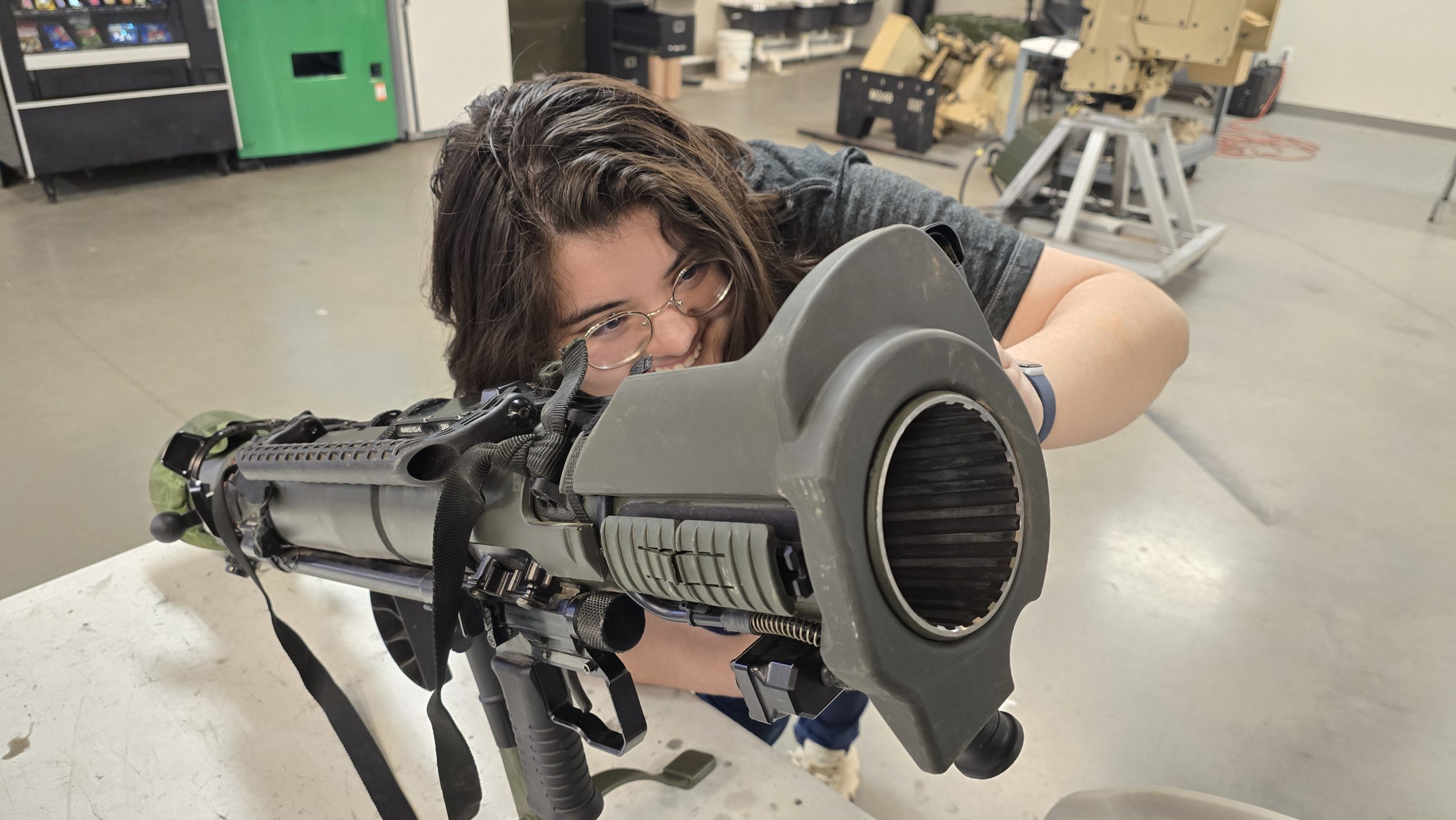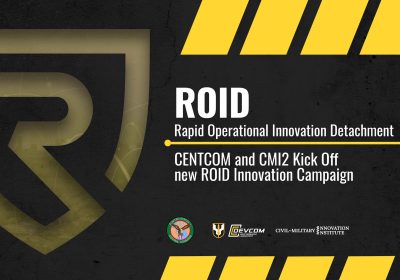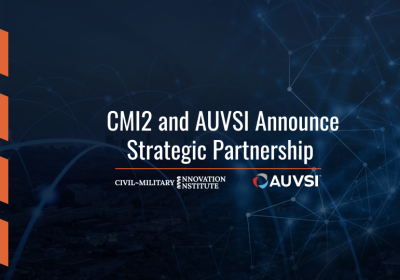Simona Vest, a senior engineering technology major at APSU, works on a project being developed through the EagleWerx Applied Tactical Innovation Center at Fort Campbell.
Read the original article published April 29, 2025, by Colby Wilson, Austin Peay State University.
APSU, EagleWerx form dynamic partnership for military innovation
CLARKSVILLE, Tenn. – When opportunities for real-world experience intersect with cutting-edge military innovation, unique learning experiences emerge.
This is precisely what students from Austin Peay State University’s College of Science, Technology, Engineering, and Mathematics (STEM) are discovering through their collaboration with Fort Campbell’s EagleWerx Applied Tactical Innovation Center, a hub for solving military challenges with practical and innovative solutions.
Bridging Education and Innovation
Eaglewerx serves as a dynamic environment where the ingenuity of academia can meet the practical needs of military operations via the U.S. Army Combat Capabilities Development Command (DEVCOM) Army Research Laboratory’s Pathfinder program, in collaboration with the Civil-Military Innovation Institute (CMI2). The program’s partnership with Austin Peay allows students working as CMI2 interns at Eaglewerx a rare glimpse into the military’s problem-solving and tactical innovation processes, offering them a chance to apply their academic learnings in real-world scenarios.
“Our collaboration with Austin Peay allows us to bring fresh, innovative ideas into military projects,” said Scott Homer, a CMI2 Pathfinder Warfighter Innovation Chief (PWIC) at Fort Campbell. “Students work on actual soldier problem sets and develop solutions with tangible impacts.”
This collaboration is part of a broader initiative within the armed forces community to involve educational institutions in military innovation, ensuring that student input contributes significantly to solving tactical and logistical issues faced by soldiers.
“We face problems where we might not know or might only have an idea of the answer based on 20 years of military experience,” said Rob Leach, CMI2 PWIC. “But the 22-year-old engineering genius could pull out something he’s read online that solves it. We try to approach these problems with solutions based on our military background and then reach out to subject matter experts, get that diversity of thought, and try to find solutions to these problems.”

Scott Homer, a CMI2 Pathfinder Warfighter Innovation Chief (PWIC) at Fort Campbell, has worked closely with APSU students interning at EagleWerx.
A Unique Internship Experience
The internships offered through this collaboration are far from the typical roles that many students encounter. Designed to be immersive and enriching, they provide students with the chance to roll up their sleeves and tackle genuine military challenges. From software development to advanced engineering projects, students are exposed to a variety of work that demands both creativity and technical expertise.
“Students learn industry practices, work on actual problems, and collaborate with stakeholders,” said Spc. Lance Lee. “They’re gaining skills that take value straight to industry. This isn’t just theory work—it’s application. Every project provides a new learning curve, and students quickly adapt to the demands of each.”
The CMI2 interns at Eaglewerx are tasked with developing solutions that not only meet current military needs but also anticipate future challenges. This proactive approach is central to the internship experience, ensuring that the work students do has lasting value.
“We focus on projects that allow students to use their engineering skills in practical ways, such as our wheeled litter project,” said Leach. “They start with a concept and develop it into something that could be used in the field.”

Senior engineering physics major Jair Martinez, at center, works on a project being developed through the EagleWerx Applied Tactical Innovation Center at Fort Campbell.
Real-World Problem Solving
One of the standout features of the internship is its emphasis on the entire product development cycle. Students work from the ground up, engaging in every stage of the process—from problem identification and wireframing to prototyping and testing. This comprehensive approach equips students with a full spectrum of skills, enhancing their problem-solving, project management, and technical abilities.
“We don’t chase aggressive milestones here,” Lee said. “The goal is for students to learn first. If the research takes time, that’s perfectly fine. It’s important that each solution is thoroughly vetted and optimized before it’s put to use.”
This hands-on experience allows students to refine their skills in a real-world setting, preparing them for future roles in the industry or in further research and development contexts.
“What we’re doing here is giving students a chance to engage with real problems and see their solutions come to life,” said Ben Hall, a CMI2 PWIC. “They’re contributing to important military projects and learning vital skills along the way.”

Jordan Kublickis, a senior engineering technology major at APSU, works on a project being developed through the EagleWerx Applied Tactical Innovation Center at Fort Campbell.
Building a Professional Portfolio
By the end of their internships, students have more than just improved skills; they walk away with tangible results that they can include in their professional portfolios. From software applications being used by the U.S. Army to engineering prototypes field-tested by soldiers, these projects provide excellent additions to any resume.
“One of my goals is ensuring that students leave with strong LinkedIn profiles, showcasing the work they did here,” Lee said. “They have real-world experience and projects that they can communicate to future employers, which is invaluable.”
Internships at EagleWerx not only enhance technical skills but also help students build a network of professional contacts with military and industry partners. This network can prove instrumental as students transition into their careers.
A Bright Future
As the partnership between Austin Peay and EagleWerx continues to evolve, the potential for creating enduring educational and professional opportunities remains promising. The collaboration not only fosters innovation but also empowers students to become leaders in their fields, equipped with the skills and experiences needed to drive future advancements.
“Our goal is to provide students with skills and experiences that prepare them for the real world,” Lee said. “It’s about solving soldier problems while nurturing the next generation of innovators. This partnership is just the beginning of what we can achieve together.”
The partnership between Austin Peay and EagleWerx exemplifies how academia and military collaboration can lead to significant advancements and opportunities. As students continue to engage in this innovative environment, they are not only contributing to military solutions but also shaping their own futures as skilled professionals ready to tackle any challenge.
About the Austin Peay College of STEM
The College of Science, Technology, Engineering & Mathematics (STEM) provides studies for students in the areas of agriculture, astronomy, aviation sciences, biology, chemistry, computer science, earth and environmental sciences, engineering physics, engineering technology, information technology, mathematics, medical laboratory sciences, radiologic sciences and physics. Our outstanding, discipline-based programs are student-centered and designed to prepare students for responsible positions at all levels of research, industry, education, medicine and government positions.




